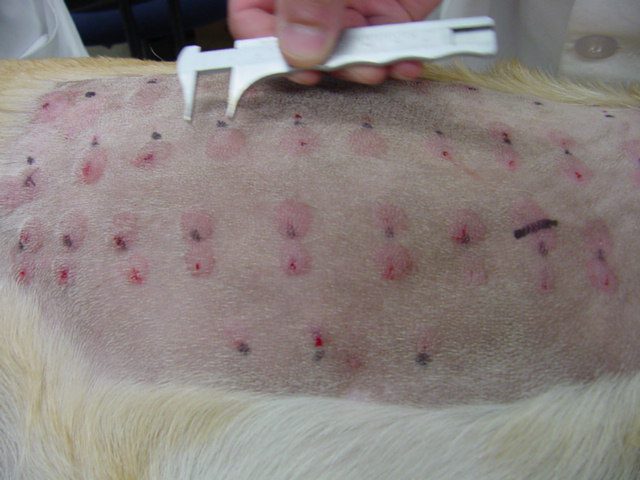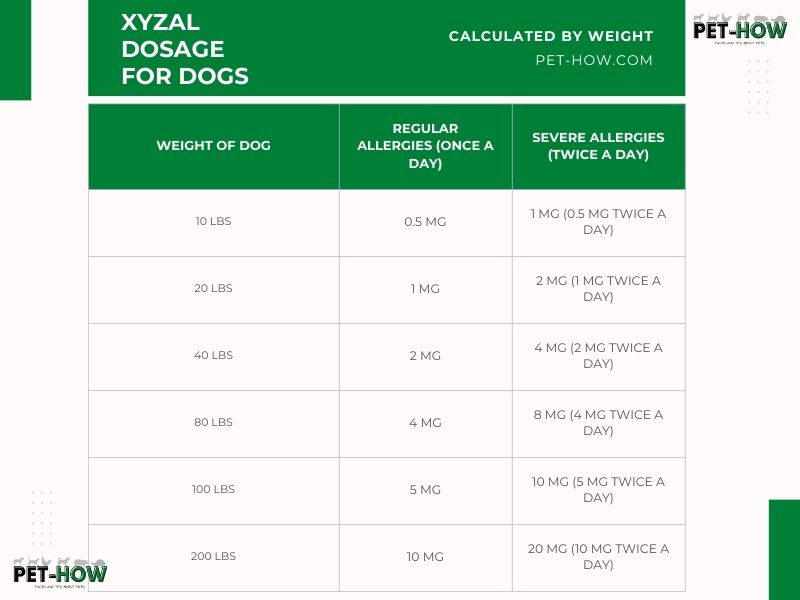If your dog suffers from allergies, you may be wondering if Xyzal is a safe medication to give them. This is a question that many pet owners ask, as Xyzal is one of the most popular allergy medications on the market.
In this blog post, we will take a look at the truth about Xyzal and whether or not it is safe for dogs with allergies.
While Xyzal (levocetirizine) can be used safely for dogs with allergies, it is recommended to never administer any medications to your dog without the advice of a veterinarian.
What is Xyzal
Xyzal (levocetirizine) is an antihistamine medication used to treat symptoms of allergies such as watery eyes, runny nose, itching eyes/nose, and sneezing. It is the brand name for levocetirizine dihydrochloride, a type of antihistamine that works by blocking the action of histamine in the body.
Histamine is a chemical released by the body in response to allergens or irritants. By blocking its action, Xyzal can help reduce allergy symptoms and provide relief from discomfort.
Xyzal is available in both tablet and liquid form and can be taken once daily for long-term relief from allergy symptoms. It has been found to be effective in treating both seasonal allergies and chronic urticaria (hives).
Overall, Xyzal (levocetirizine) is an effective medication for relieving allergy symptoms and providing long-term relief from discomfort caused by allergies. It can be taken once daily and has been found to be safe and effective when used as directed.
Xyzal is available over the counter in a 24-hour formula and comes in both adult and children’s versions. It is important to follow the instructions on the package label for proper dosage according to VCAHospitals.
Is Xyzal Safe For Dogs With Allergies?

Xyzal is an antihistamine that is safe for dogs with allergies and should only be given to dogs under the guidance of a veterinarian to ensure safety and appropriate dosing.
While primarily a human allergy medication, Xyzal can be safe for dogs with allergies, but should only be administered under the strict supervision of a veterinarian due to the varied responses in different dogs.
Xyzal is an over-the-counter antihistamine often used by humans to deal with various allergy symptoms.
While it is not uncommon for some of these medications to cross over for use in pets, it’s important to remember that every animal is unique and might react differently.
Dogs, in particular, have been known to have varying responses to antihistamines.
Therefore, even though it’s possible for Xyzal to alleviate allergy symptoms in dogs, it’s imperative that this medication is given only under the direct supervision of a veterinarian.
According to a case study done by MD Denise K.C over at American Family Physician, Xyzal can be used safely on dogs suffering from allergic rhinitis.
In my years of practice as a veterinarian, I’ve seen numerous cases where pet owners have tried to self-medicate their dogs using human drugs, often leading to complications.
It’s crucial to understand that what works for humans doesn’t always work for our canine friends.
So, even though some sources suggest that Xyzal could be used to treat dog allergies, it’s always best to consult with a professional before administering any new medication to your pet.
The health and well-being of your furry friend should always be the top priority according to Kingsdale.
Types of Xyzal Safe For Dogs

Xyzal, also known as levocetirizine, is available in both tablet and liquid forms that are safe for dogs when given under appropriate guidance.
Xyzal Tablets
The most common form of Xyzal is in the form of tablets. These tablets contain levocetirizine, an antihistamine that is used to treat and prevent itching associated with allergic reactions in dogs. It’s crucial to administer the correct dosage based on the dog’s weight and severity of allergies.
Overdosing can lead to adverse effects like vomiting, lethargy, or even more serious complications. In my practice, I’ve seen many dogs respond positively to this form of medication, finding relief from their allergy symptoms.
Most OTC antihistamines can be used in dogs, however, you should never give any medications to your dog without the advice of your veterinarian… if antihistamine use is indicated, he or she can give you a proper dose says Dr. Angel Alvarado, LVT.
Xyzal Oral Solution
Xyzal oral solution is another form of medication that is safe for dogs. This liquid formulation can be easier to administer, especially for dogs that have difficulty swallowing pills.
The same weight-based guidelines apply to the oral solution as to the tablet form. Over my years of veterinary practice, I’ve found that some pet owners prefer the oral solution for its ease of use and gentler administration process.
Despite the safety of Xyzal for dogs, it is vital to remember that any new medication should always be administered under professional supervision. Always monitor your dog closely after administering any new medication and seek immediate veterinary attention if any unusual reactions occur says BPAH.
When To Give Xyzal To Dogs

Xyzal is typically given to dogs to manage symptoms of allergies, particularly those caused by environmental factors like pollen, dust mites, or mold.
Environmental Allergies
Dogs can suffer from environmental allergies, much like humans. These can be caused by various factors such as pollen, dust mites, mold, or even certain fabrics. Symptoms may include itching, redness, sneezing, and sometimes respiratory distress. Xyzal works by blocking histamines, the compounds that trigger allergic reactions, thereby providing relief from these symptoms.
From my experience as a veterinarian, I’ve seen many dogs benefit greatly from antihistamines like Xyzal when dealing with environmental allergies. It’s important to note though, that each dog is unique and may respond differently to this medication says Dr. Linda (Pet Specialist).
Seasonal Allergies
Seasonal allergies are another common reason to administer Xyzal to dogs. These are allergies that occur at certain times of the year, often in response to changes in the environment. Common triggers include tree pollen in the spring, grass pollen in the summer, and weed pollen in the fall.
In my years of practice, I’ve found that Xyzal can be particularly helpful in managing the symptoms of seasonal allergies in dogs. However, it’s crucial to consult with a vet before starting any new medication regimen.
Chronic Allergies
For dogs suffering from chronic allergies, Xyzal can provide much-needed relief. Chronic allergies can cause ongoing discomfort for your pet, leading to symptoms like constant itching, skin infections, and even behavior changes.
In my practice, I’ve seen how effective Xyzal can be in managing chronic allergies in dogs. However, it’s always important to have a comprehensive treatment plan in place, which could include other medications, dietary changes, and possibly allergy shots says iMedix.
Is Xyzal Good For Dog Allergies?

Yes, Xyzal (levocetirizine) is often recommended and considered safe for dogs with allergies, but should only be administered under the advice of a veterinarian.
Xyzal can be used to treat a wide variety of allergy symptoms in dogs, including sneezing, runny nose, watery eyes, and itchiness. It is important to note that Xyzal will not cure your dog’s allergies, but it can help to provide relief from the symptoms.
Xyzal is an antihistamine that is used to relieve symptoms of allergies. The active ingredient in Xyzal is levocetirizine, which is a histamine blocker.
Histamines are chemicals that are released by the body in response to allergens, and they cause symptoms such as sneezing, itching, and watery eyes. By blocking histamines, Xyzal can help to reduce these symptoms as per WagWalking.
In addition to levocetirizine, Xyzal also contains excipients such as microcrystalline cellulose and crospovidone. Excipients are inactive ingredients that are used to bind, fill, or dissolve the active ingredient in a medication.
While Xyzal is generally considered to be safe and effective, it is important to speak with a veterinarian before giving your dog this medication. This is because Xyzal may interact with other medications, and it is not suitable for everyone.
For example, dogs with liver or kidney disease should not take Xyzal. Additionally, Xyzal may cause side effects such as drowsiness or dizziness. Therefore, it is important to be aware of these potential side effects before taking this medication.
According to a study done by Clinical and Translational Science, Xyzal had no negative effects on a Beagle dog.
Xyzal Proper Dosage For Dogs By Weight

| Weight of Dog | Regular Allergies (Once a Day) | Severe Allergies (Twice a Day) |
|---|---|---|
| 10 lbs | 0.5 mg | 1 mg (0.5 mg twice a day) |
| 20 lbs | 1 mg | 2 mg (1 mg twice a day) |
| 40 lbs | 2 mg | 4 mg (2 mg twice a day) |
| 80 lbs | 4 mg | 8 mg (4 mg twice a day) |
| 100 lbs | 5 mg | 10 mg (5 mg twice a day) |
| 200 lbs | 10 mg | 20 mg (10 mg twice a day) |
As a veterinarian, it’s crucial to administer the correct dosage of Xyzal based on the dog’s weight and severity of allergies.
For instance, a dog weighing 10 lbs with regular allergies should be given a dose of 0.5 mg once a day. If the same dog has severe allergies, the dosage should be increased to 1 mg, split into two doses of 0.5 mg each. As the weight of the dog increases, so does the dosage.
A 100 lbs dog would require 5 mg for regular allergies and 10 mg, split into two doses, for severe allergies. However, it’s important to note that the dosage should not exceed 20 mg, regardless of the dog’s weight.
These guidelines are critical in ensuring the safe and effective use of Xyzal in dogs.
Nevertheless, an individual dog’s health, breed, and age should always be taken into account when determining the appropriate dosage, and any new medication should only be administered under professional supervision says Xyzal.
How Long Does It Take For Xyzal To Start Working In Dogs?

Xyzal typically starts to work in dogs within one hour, providing relief from allergy symptoms.
From my years of experience as a veterinarian, I’ve found that Xyzal, like other antihistamines, works relatively quickly in dogs.
It begins to take effect within an hour, which aligns with the general timeline for most antihistamines. This rapid onset of action can be particularly beneficial for dogs suffering from acute allergic reactions, as it allows for prompt relief of uncomfortable symptoms.
However, each dog is unique, and factors such as the dog’s overall health, the severity of the allergies, and the dog’s individual response to medication can influence how quickly Xyzal takes effect.
Some dogs may show noticeable improvement within the first hour, while others may take a bit longer to respond.
It’s also worth noting that while Xyzal can provide immediate relief from symptoms, managing allergies in dogs often requires a comprehensive approach.
This might include regular medication, changes in diet, and environmental modifications to minimize exposure to allergens says Chewy.
Possible Side Effects of Xyzal In Dogs

Possible side effects of Xyzal in dogs can range from vomiting and increased salivation to drowsiness and hyperactivity.
Vomiting and Increased Salivation
One of the potential side effects of Xyzal in dogs is vomiting. This is typically observed in some dogs, often when they are introduced to the medication for the first time. In my experience as a veterinarian, this is not an uncommon reaction, especially if the dog has a sensitive stomach. Increased salivation is another possible side effect, though it’s less common than vomiting.
Drowsiness and Fatigue
Drowsiness and fatigue are among the most common side effects of antihistamines, including Xyzal, in dogs. This is particularly noticeable with the first few doses. In my practice, I’ve seen many dogs become unusually sleepy or tired after taking their medication. However, this side effect tends to lessen over time as the dog’s body gets used to the medication.
Hyperactivity
Contrary to the sedative effects, some dogs may exhibit signs of hyperactivity after taking Xyzal. This could manifest as restlessness, excessive playfulness, or difficulty settling down. While less common, I have seen instances of this in my veterinary practice.
More Serious Effects
In rare cases, and often due to an overdose, dogs may experience more serious side effects such as a rapid or irregular heartbeat, seizures, or confusion. It’s critical to administer the correct dosage based on the dog’s weight to avoid these potential complications.
Alternatives To Xyzal For Dogs

When looking for alternatives to Xyzal for dogs, there are several options available. Here are some of the best antihistamines for dogs:
- Benadryl (Diphenhydramine). This is the most commonly used antihistamine for dogs and can be found in many over-the-counter medications. It is effective at treating mild allergy symptoms but can cause sedation in some cases.
- Zyrtec (Cetirizine). This is a newer antihistamine that has become popular among pet owners due to its convenient dosing schedule. It is also effective at treating mild allergy symptoms without causing sedation.
- Claritin (Loratadine). This antihistamine produces less sedation than Benadryl does, but could still make your dog sleepy in some cases.
- Chlorpheniramine (Chlortimeton). This antihistamine is not as commonly used as the others listed here, but it can be an effective alternative for those who want to avoid sedation side effects.
By considering these different options and consulting with your veterinarian, you can find the best antihistamine for your dog’s specific needs.
Are There Any Drugs That Interfere With Xyzal?
| Drug | Interaction with Xyzal | Veterinarian’s Experience |
|---|---|---|
| Digoxin | May alter the effectiveness of either drug and could potentially lead to adverse effects. | Careful monitoring is required when dogs are on both these medications. |
| Central Nervous System Depressants (e.g., Diazepam) | Can enhance the sedative effects of Xyzal, potentially leading to excessive drowsiness or lethargy. | Dosage adjustments and careful monitoring are needed for dogs on both these medicines. |
| Gabapentin, Trazodone, Sertraline | Interactions may occur but are not typically a concern unless the dog is on high doses of these medications or has other health concerns. | These interactions are not commonly a concern but require vigilance if the dog is on high doses or has other health issues. |
There are several drugs known to interfere with Xyzal in dogs, including digoxin, certain central nervous system depressants like diazepam, and medications such as gabapentin, trazodone, and sertraline.
Digoxin
Digoxin, a medication used to treat heart conditions in dogs, can interact with Xyzal. This interaction may alter the effectiveness of either drug and could potentially lead to adverse effects. In my years of practice, I’ve had to carefully monitor dogs on both these medications to ensure their safety and health.
Central Nervous System Depressants
Central nervous system depressants, such as diazepam, interact with Xyzal. These drugs can enhance the sedative effects of Xyzal, potentially leading to excessive drowsiness or lethargy in dogs. I’ve seen cases where dogs on both these medications needed careful dosage adjustments and monitoring.
Gabapentin, Trazodone, and Sertraline
Other medications that may interact with Xyzal include gabapentin, trazodone, and sertraline. Although these drugs are not commonly used in dogs, when they are, it’s important to be aware of potential interactions. In my experience, these interactions are not typically a concern unless the dog is on high doses of these medications or has other health concerns.
What If I Miss Giving My Dog Xyzal On Time?

If you miss giving your dog Xyzal on time, it’s generally recommended to administer the dose as soon as you remember, unless it’s close to the time for the next dose.
In situations where you realize that a dose of Xyzal has been missed, it’s best to give the medication to your dog as soon as possible.
However, if it’s close to the time of the next scheduled dose, it’s usually safer to skip the missed dose and continue with the regular dosing schedule. Doubling up on doses can potentially lead to an overdose, which could cause serious side effects.
From my experience as a vet, it’s not uncommon for pet owners to occasionally forget a dose. While it’s important to try and stick to the dosing schedule as closely as possible for maximum effectiveness of the medication, a single missed dose is usually not cause for concern.
However, consistently missing doses or irregular dosing can affect the effectiveness of the medication and potentially the health of your dog.
When To Seek Medical Assistance For Dog Taking Xyzal

You should seek medical assistance for your dog taking Xyzal if they show signs of an allergic reaction, excessive drowsiness, or any other unusual behavior.
If your dog is taking Xyzal and begins to exhibit symptoms such as difficulty breathing, swelling of the lips, tongue or face, or hives, these could be signs of an allergic reaction and you should seek immediate veterinary care.
Similarly, while some degree of drowsiness might be expected, if your pet becomes excessively sedated, unresponsive, or unusually lethargic, it’s important to contact a veterinarian right away.
From my professional experience, I’ve also seen cases where dogs have exhibited gastrointestinal upset, including vomiting or diarrhea, after taking certain medications. If your dog shows persistent signs of stomach distress, it would be wise to consult a vet.
In addition to these specific reactions, any sudden or major change in your dog’s behavior, appetite, or general health warrants a call to the vet. It’s always better to be safe and get professional advice when it comes to your pet’s well-being.
FAQs
Q: What are the common symptoms of allergies in dogs?
A: Common symptoms of allergies in dogs include itching, redness or inflammation of the skin, hair loss, ear infections, sneezing, coughing, and watery eyes.
Q: Can dogs be allergic to Xyzal?
A: There have been no reported cases of dogs being allergic to Xyzal. However, as with any medication, individual dogs may have different reactions, so it is important to monitor your dog closely for any signs of an allergic reaction when introducing a new medication.
Q: Can Xyzal be used to treat seasonal allergies in dogs?
A: Xyzal is not specifically approved for use in dogs to treat seasonal allergies. It is always recommended to consult with a veterinarian who can prescribe the appropriate treatment.
Q: How should Xyzal be administered to dogs?
A: Since Xyzal is not approved for use in dogs, there are no specific guidelines for its administration in dogs. It is important to follow the dosing instructions provided by a veterinarian for any medications prescribed to your dog.
Q: Can Xyzal be used in combination with other allergy medications for dogs?
A: It is always important to consult with a veterinarian before combining different medications for your dog’s allergies. Some medications may interact with each other and have unintended effects. A veterinarian can provide guidance on the appropriate combination of medications for your dog.
Q: Can Xyzal be used for long-term allergy management in dogs?
A: Xyzal is not approved for use in dogs and there are no long-term studies evaluating its safety and efficacy in dogs. It is best to consult with a veterinarian who can recommend a suitable long-term allergy management plan for your dog.
Conclusion and final thoughts
It is important to remember that every dog is unique and will respond differently to medications. Xyzal may be safe for some dogs but could cause serious side effects in others.
That is why it is essential to consult with your vet before giving any medication or supplement to your dog.
They will help you decide if Xyzal or another medication is the right choice for your pup.




